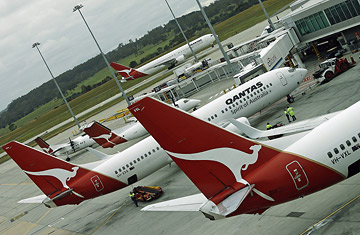
Qantas aircraft line the apron of Melbourne's Tullamarine Airport
Investigators studying last week's explosion aboard Qantas Flight 30 believe a burst oxygen tank, and not a bomb, was responsible for the blast and forced emergency landing in Manila. The explosion ripped a 9-foot hole through the side of a Qantas Boeing 747 — and an even bigger hole in the airline's reputation. In its 88-year history, the Australian carrier has had no fatal accidents and only three previous "major safety events." But that record ensures that even small incidents make headlines. Since 2006 there have been a growing list of such relatively minor mishaps: burst tires, a burning engine, a fallen engine panel, an aborted takeoff, a forced switch to battery power as a plane landed. The July 25 incident was far more serious. It was "a tremendously bad one," said Qantas CEO Geoff Dixon, "and it's one we regret."
Unfortunately for Qantas, it wasn't the end of their problems. Three days after the emergency landing in Manila, a Qantas jet bound for Melbourne turned around mid-flight and returned to Adelaide after the door on a wheel bay failed to close. "There was no safety risk at any time," assured a company spokeswoman. But for some passengers, two incidents in less than a week proved too much: they refused to board the alternate aircraft Qantas arranged, saying they'd rather take a bus.
Adding to Qantas' headaches is a dispute with unions over cost-cutting measures. These include recently announced plans to axe 1500 jobs and increase the amount of aircraft maintenance done outside Australia. Last month, rolling strikes by engineers forced the cancellation of dozens of flights. A pilot with the airline told The Australian newspaper: "Qantas outsourcing maintenance to Malaysia is certainly worrying a lot of us pilots. There has been aircraft come back with dodgy staples to secure wiring." Qantas chief pilot Capt. Chris Manning said the airline's standards are "the same as they've always been — the highest in the world."
But Alan Joyce, the smart, energetic CEO of Qantas' discount subsidiary Jetstar, who will take over as CEO from Dixon, who is retiring in November, recently suggested that simply cutting costs might not be enough to keep the company viable. Qantas, he said, might have to merge with another airline in the next few years. "With the high fuel prices we have, if that continues, a lot of airlines are not economic if they stand alone," Joyce told reporters. Qantas' "never crashed" reputation will hopefully survive, but there's no certainty its name will.
